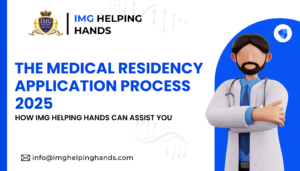
The Medical Residency Application Process 2025: How IMG Helping Hands Can Assist You
Have you ever wondered what it truly takes to secure your dream residency in an ever-evolving medical landscape? As we step into 2025, the residency

Clinical experience is an essential part of preparing for a career in healthcare. Direct patient contact and hands-on learning in a clinical setting helps students and pre-professionals develop the skills and knowledge needed to provide compassionate, competent care. However, finding opportunities for clinical experience can be challenging, especially for students with limited time and resources. The good news is that there are many options to gain free clinical experience across the United States.
One of the best ways to get free hands-on clinical experience is to volunteer at hospitals, clinics, and other healthcare facilities. Many hospitals have volunteer programs specifically designed for pre-medical students and other pre-health professionals. Volunteer duties may include transporting patients, stocking supplies, sitting at information desks, assisting with administrative tasks, and more.
This allows volunteers to interact with patients, work alongside healthcare professionals, and become familiar with the clinical environment. Some volunteer programs even allow participants to shadow physicians, nurses, or other providers as they assess and treat patients.
Major hospital systems like Kaiser Permanente on the West Coast and Houston Methodist in Texas run robust volunteer programs to engage aspiring clinicians. Free clinics and community health centers also frequently rely on volunteers and are ideal places to gain experience serving underserved and uninsured patient populations. Volunteers should be professional, reliable, and maintain patient confidentiality at all times. Logging at least 50-100 hours of clinical volunteer work is recommended for pre-health students.
Shadowing a physician, physician assistant, nurse practitioner, or other healthcare provider is an excellent way to observe clinical decision making and patient care up close. Many healthcare professionals are happy to have students shadow them, but finding these opportunities takes effort. A good place to start is by asking family friends, neighbors, or other personal contacts who work in healthcare if they would be open to having you shadow them. Also reach out to healthcare providers you may interact with as a patient.
Your college pre-health advisor and LinkedIn networking can also connect you with potential shadowing opportunities. Be sure to communicate that you are seeking an unpaid shadowing experience solely for your education when reaching out to providers to shadow.
Follow all policies, maintain patient privacy, be professional, and express gratitude for the learning opportunity. Trying to shadow clinicians across different specialties and settings like primary care, surgery, emergency medicine, physical therapy, mental health counseling, and more can provide well-rounded clinical exposure.
Reach out to us to Get complete details regarding US Clinical Experience
If you are currently a college student, your school likely has resources to help you find local clinical experience opportunities. Many colleges have pre-health advising offices or career services departments that coordinate clinical experiences for students. This may include partnerships with nearby healthcare facilities for shadowing, internships, or volunteering.
Some schools also have student-run clinics, medical brigades, or other hands-on programs led by faculty and medical students. Additionally, courses with a clinical component like anatomy lab, rehabilitative therapy, and more can provide valuable hands-on learning. Reach out to peers who have found great clinical opportunities through your school.
GAP (Global Access Pipeline) and HOSA (Health Occupations Students of America) run programs to give students clinical learning and mentoring opportunities. GAP has a database of short virtual and in-person clinical experiences across over 20 healthcare fields available to student members.
HOSA members can participate in clinical shadowing externships and hands-on competitive event programs in health science skills. Both organizations have local chapters across the U.S. and partnership hospitals where students can gain experience. They provide excellent networking and resume building opportunities.
Gaining experience in other healthcare roles outside of your specific interests can also be valuable. For example, students interested in physical therapy could volunteer as aides in a nursing home to work with elderly patients.
Those interested in dentistry could apply for paid roles as dental assistants to observe in clinics. Working or volunteering in healthcare administration, medical billing, pharmacy tech jobs, emergency services, public health organizations and more exposes you to healthcare operations, electronic records, insurance processes and interdisciplinary teams.
Some students seek clinical experience abroad through international medical internships or global health volunteering. Many programs are available worldwide and offer unique cultural and clinical immersion at clinics overseas. Some programs like Child Family Health International are free outside of travel costs. Others like Projects Abroad are quite expensive. Weigh costs, ethics of short term medical trips, and program quality carefully when looking into abroad clinical experiences.
Virtual simulations, case studies, clinics at academic conferences, CPR and first aid classes, online medical courses and watching surgeries on video may provide additional ways to engage with clinical environments at no cost. Reading memoirs and books from healthcare professionals can also provide meaningful insights into patient care. While these alternatives do not replace in-person clinical hours, they can supplement hands-on learning.
– Check hospital and clinic volunteer programs, shadowing opportunities with family contacts, pre-health advising at your college, student-run clinics and national organizations like GAP and HOSA.
– Seek experiences across diverse settings and specialties – primary care, surgery, mental health etc. Total 50-100+ hours of direct patient interaction.
– Always be professional, follow policies, protect patient privacy and show gratitude.
– Look beyond traditional pre-med roles – nursing, rehab, administration, tech jobs provide valuable perspective.
– Consider international and alternative free options, but don’t replace in-person hours.
– Start early and be persistent! It takes dedication to find quality free clinical opportunities.
Gaining hands-on clinical experience is a crucial part of pre-health education. While it requires effort and initiative, there are many ways for students to gain invaluable free direct patient care hours through volunteering, shadowing, campus resources, national programs and more. Taking advantage of multiple opportunities will provide well-rounded exposure to healthcare environments, deepen understanding of patient care, and strengthen applications for future health professions.
Get our most valuable tips right inside your inbox, once per month!

Have you ever wondered what it truly takes to secure your dream residency in an ever-evolving medical landscape? As we step into 2025, the residency

For IMGs, to practice medicine in USA is more than just passing USMLE and securing a residency; it also involves surfing through the intimidating visa
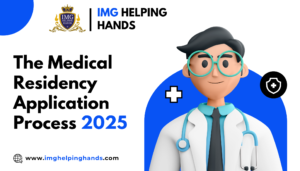
Are you ready to embark on one of the most transformative journeys in your medical career? The residency match process is a pivotal step for
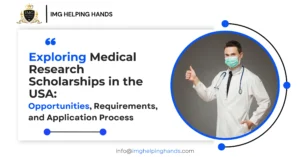
Pursuing medical research in the United States offers unparalleled opportunities for academic growth, access to cutting-edge technology, and the ability to work alongside leading experts
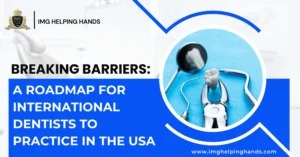
Embarking on a journey to practice dentistry in the United States is a dream for many international dentists. In the vast landscape of American dentistry,
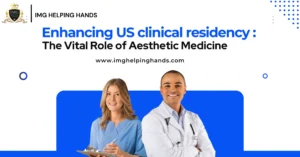
Have you ever considered the transformative power of aesthetics in the field of medicine? Is aesthetic medicine the silent cornerstone of modern clinical practice? Within
We are here to provide a safe and secure helping hand for medical students, graduates, and residents.
Our comprehensive guide will assist you in matching with your top-choice residency or fellowship program.




Payment Methods
Buy with Confidence
© IMG Helping Hands Copyrights 2024 Developed By Ecom Thrust